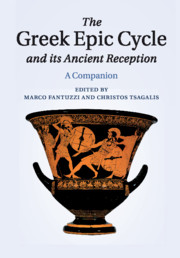Book contents
- Frontmatter
- Contents
- List of illustrations
- List of contributors
- Editorial note
- Introduction: Kyklos, the Epic Cycle and Cyclic poetry
- PART I APPROACHES TO THE EPIC CYCLE
- PART II EPICS
- PART III THE FORTUNE OF THE EPIC CYCLE IN THE ANCIENT WORLD
- 22 The aesthetics of sequentiality and its discontents
- 23 The Epic Cycle, Stesichorus, and Ibycus
- 24 Pindar's Cycle
- 25 Tragedy and the Epic Cycle
- 26 The Hellenistic reception of the Epic Cycle
- 27 Running rings round Troy: Recycling the ‘Epic Circle’ in Hellenistic and Roman art
- 28 Virgil and the Epic Cycle
- 29 Ovid and the Epic Cycle
- 30 Statius' Achilleid and the Cypria
- 31 The Epic Cycle and the ancient novel
- 32 The Epic Cycle and imperial Greek epic
- Works cited
- Index of principal passages
- Index nominum et rerum
25 - Tragedy and the Epic Cycle
from PART III - THE FORTUNE OF THE EPIC CYCLE IN THE ANCIENT WORLD
Published online by Cambridge University Press: 05 August 2015
- Frontmatter
- Contents
- List of illustrations
- List of contributors
- Editorial note
- Introduction: Kyklos, the Epic Cycle and Cyclic poetry
- PART I APPROACHES TO THE EPIC CYCLE
- PART II EPICS
- PART III THE FORTUNE OF THE EPIC CYCLE IN THE ANCIENT WORLD
- 22 The aesthetics of sequentiality and its discontents
- 23 The Epic Cycle, Stesichorus, and Ibycus
- 24 Pindar's Cycle
- 25 Tragedy and the Epic Cycle
- 26 The Hellenistic reception of the Epic Cycle
- 27 Running rings round Troy: Recycling the ‘Epic Circle’ in Hellenistic and Roman art
- 28 Virgil and the Epic Cycle
- 29 Ovid and the Epic Cycle
- 30 Statius' Achilleid and the Cypria
- 31 The Epic Cycle and the ancient novel
- 32 The Epic Cycle and imperial Greek epic
- Works cited
- Index of principal passages
- Index nominum et rerum
Summary
Introduction
In the twenty-third chapter of his Poetics, Aristotle is arguing that an epic, as much as a tragedy (if not quite in the same way), ought to be composed around ‘a single, whole, complete action, having a beginning, a middle and an end’ (1459a20–1), and he praises Homer (i.e. the poet of the Iliad and Odyssey) for perceiving this and choosing for his subject, not even the whole of the Trojan War, but just one cohesive part of it (the events arising from the quarrel between Achilles and Agamemnon).
The others compose poems of many parts about one person, one period, or one action, like the author of the Cypria and of the Ilias parva. Therefore out of the Iliad and Odyssey respectively only one or two tragedies are made, while from the Cypria there can be many and from the Ilias parva eight – say, the Award of the Arms, Philoctetes, Neoptolemus, Eurypylus, the Beggar Mission,The Laconian Women, the Iliou persis and the Departure.
The claim that one can make ‘only one or two tragedies’ out of the Iliad or Odyssey does not quite stand up. Aeschylus, after all, created a complete trilogy out of each of the two epics. Sophocles may have written three plays based on episodes from the Odyssey – Nausicaa or The Washerwomen (from book 6), The Phaeacians (presumably from books 7–12 or some part thereof), and The Foot-Washing (from book 19, unless – as has also been suggested6 – it was actually about events leading to Odysseus' death and identical with Sophocles' Odysseus and the Fatal Spine). But the Odyssey does, much more than the Iliad, contain within its overall unity many episodes that can if desired be treated as self-contained stories. The relevant thing about the Cyclic epics, and especially the two that Aristotle singles out, was that they consisted almost entirely of such episodes, with little if any overall unity. And they were indeed, as Aristotle implies, massively exploited by the great tragedians, to the extent of about twenty-two plays in the corpus of Aeschylus, twenty-three in that of Euripides, and no less than forty-seven (about two-fifths of his total output) in that of Sophocles. As we shall see, however, it was the Cypria rather than the Ilias parva that was the most popular source.
- Type
- Chapter
- Information
- The Greek Epic Cycle and its Ancient ReceptionA Companion, pp. 461 - 486Publisher: Cambridge University PressPrint publication year: 2015
- 8
- Cited by



